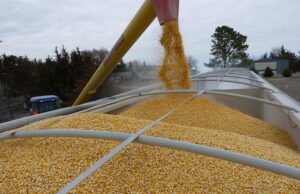
Agro-industrial holding Astarta does not expect a significant drop in income because of the ban on imports of agricultural products from Ukraine imposed by Poland and other neighboring countries, as it intends to export its products to Western European countries, representatives of the company’s board said at an online conference on Tuesday.
“We have permission to transit through these countries. Rather, our export targets are Western European countries, such as Spain, Italy, Greece and Croatia. We don’t see much risk to our revenues,” Infostrefa quoted Astarta Commercial Director Vyacheslav Chuk as saying from a conference call Tuesday.
Julia Bereshchenko, director of investor relations, expressed confidence that Astarta will be supported by expected sugar shortages in the EU and world market.
“Sugar shortages are expected not only in the EU, but worldwide as the world’s largest sugar producers, such as Brazil and India, begin to use sugar to produce ethanol. This could potentially reduce these countries’ exports,” she said.
As reported, Astarta agro-industrial holding, the largest sugar producer in Ukraine, received EUR65.16 million net profit in 2022, down 46.8% compared to 201.
The holding’s EBITDA shrank by 23.2% to EUR154.77 mln, while revenues increased by 3.8% to EUR510.07 mln.

The Hungarian Grain Association has opposed a ban on imports of agricultural products from Ukraine because it will lead to a deficit on Hungary’s domestic market and undermine efforts to curb the highest inflation rate in the European Union, Zofia Poza, secretary general of the Hungarian Grain Association, said.
“Our members are desperate and don’t support any import bans, in fact we need imports,” she told Bloomberg.
Hungary needs to import about 700,000 tons of feed corn after the 2022 crop failure, according to Hungarian grain growers.
“Eastern neighbor Ukraine will be the cheapest supplier,” she stressed.
Potsa recalled that Hungary used to only perform export control of agricultural products from Ukraine.
“Now we got a widespread ban on imports. It’s hard to call it anything other than amateurish,” the public figure said, commenting on the government’s decisions.
Poza is confident that blocking export flows will put negative pressure on food prices in Hungary, where the inflation rate exceeds 25 percent.
The Hungarian Grain Association represents the interests of flour makers, grain processors and sellers of basic food products ranging from flour and sugar to animal feed and ethanol.
Hungary has joined Poland, Slovakia and Bulgaria to impose a ban on Ukrainian grain and certain agricultural products until the end of June 2023.
While business associations in Poland are already saying that such restrictions could hurt local producers.
“Government interference in business has been a hallmark of the rule of Hungarian Prime Minister Viktor Orban, who imposed restrictions on agricultural exports in 2022 after a sharp summer decline in production,” Bloomberg writes.
The publication reminds us that the Hungarian government has also maintained a regime of controversial price controls on basic food products, which the central bank blames for inflating inflation by forcing retailers to raise the cost of other goods to make up for lost profits. Last week, the Hungarian Cabinet of Ministers announced that it would oblige supermarkets to lower the prices of basic foodstuffs as part of a new package of measures.
AGRICULTURAL PRODUCTS, BAN, Hungarian Grain Association, IMPORTS

Ukrainian sugar producers have asked EU countries to reconsider the sugar export ban on domestic EU markets and resume it taking into account the sugar shortage in Europe, Nazar Mykhailovin, acting head of Ukrtsukor, said.
“Not all countries impose an embargo on Ukrainian products. We need a way through which we can sell exports of sugar. We have to forget about the sea route for some time, but the transit through the EU countries, particularly through Poland and Romania is needed,” he commented to Interfax-Ukraine agency about the situation with the export of Ukrainian sugar to the EU.
According to the industry association, during the period from June 2022 to March 2023 almost 99.9% of Ukrainian sugar was sold on the EU internal market.
The top countries that bought Ukrainian sugar in March 2023 included Romania, Poland, Hungary, Italy, Bulgaria, the Czech Republic and Croatia. Poland, one of the first to ban imports of Ukrainian sugar, bought 8,242 tons of the product from Ukraine, Mikhailovin said.
“Since the beginning of the war, Ukraine has lost its sea export corridor, which has become inaccessible for Ukrainian sugar. Accordingly, the export was carried out mainly to European countries.
At the same time Mikhailovin reminded that due to the beginning of the war the EU made a decision, thanks to which and the presence of export potential Ukraine has the ability to export sugar to the EU domestic markets.
In the sugar beet sugar production season of the 2022 harvest, the factories produced 1.330 million tons of products, which fully met the needs of the domestic market and export potential, the industry association said.
“In the 2022/2023 marketing year, the export potential will depend on the area sown under sugar beet, weather conditions and yields in both Ukraine and Europe,” Mikhailovin said.

The world’s largest cryptocurrency exchange, Binance, is imposing a ban on dollar deposits and withdrawals, the company said in a statement, without specifying the reasons for the decision.
“We are temporarily suspending bank transfers in dollars as of Feb. 8,” said a Binance spokesman quoted by CNBC.
He added, however, that the company is working to resume these transactions as soon as possible.
Binance US, which is regulated by the U.S. Treasury’s Financial Crimes Enforcement Network (FinCEN), said in a statement posted on Twitter that the decision to suspend operations has not affected it. Thus, it only affects users outside the U.S. who transfer dollars to or withdraw dollars from bank accounts.
Binance’s announcement triggered a surge in cash outflows from the exchange’s cryptocurrency wallets, according to Arkham Intelligence.
Net cash outflows from the exchange exceeded $172 million in one day, according to DefiLlama. By comparison, the company has $42.2 billion in cryptocurrency assets, so the outflow is negligible, Arkham noted.

Holding mass events in Kyiv from August 22 to 25 is prohibited due to the high probability of rocket attacks on the city by Russian invaders, according to the order of the head of the military administration of the city Nikolai Zhirnov.
“From August 22 to 25, to prohibit the holding of mass events, peaceful meetings, rallies and other events related to a large gathering of people,” the document says.
It also contains an appeal to the local authorities of Kyiv with a request to involve the minimum necessary number of people in ensuring the life of the city during this period. For more information about the analysis and announcement of future events, see the video reviews of the Club of Experts on YouTube

The UK has decided to introduce a ban on importing Russian coal in August and on importing oil at the end of December, the UK government reported on Thursday.
“This amendment prohibits the import of oil and oil products, coal and coal products and gold as well as the acquisition, supply and delivery, directly or indirectly of these goods,” according to the clarifications published on Thursday.
It also prohibits the provision of technical assistance, financial services and funds and brokering services relating to these goods.
“The prohibition on the import of gold entered into force on 21 July, the prohibition on the import of coal will take effect on 10 August 2022 and the prohibition on the import of oil will take effect on 31 December 2022,” the UK government said.
The UK Foreign, Commonwealth & Development Office (FCDO) in April reported that the country would refuse to import Russian coal and oil during 2022, and then gas to the extent possible.
“By the end of 2022, the UK will end all dependency on Russian coal and oil, and end imports of gas as soon as possible thereafter,” the FCDO said.
BAN, IMPORT, RUSSIAN GOLD, UK